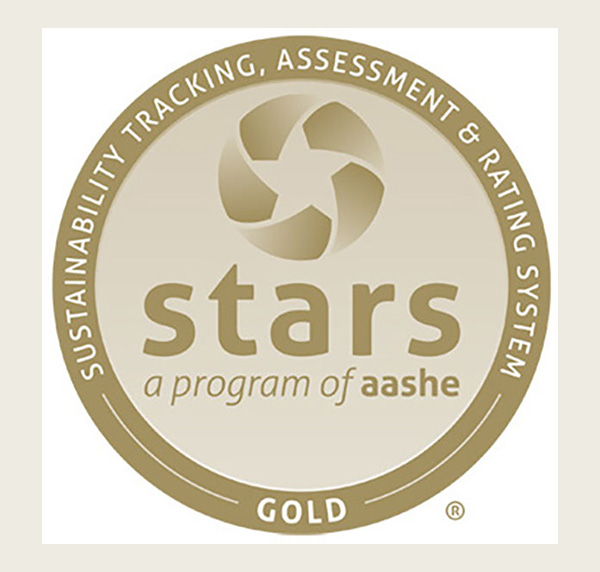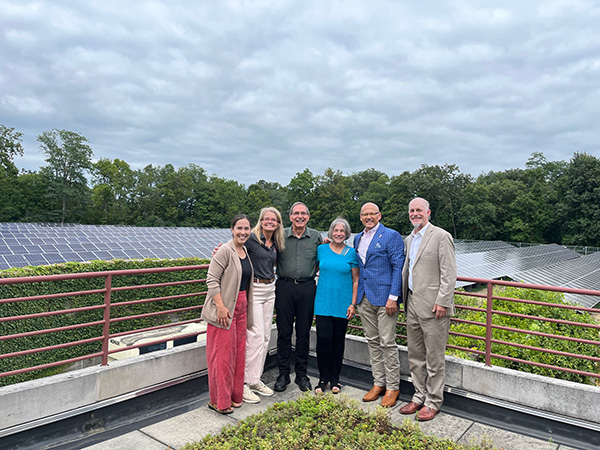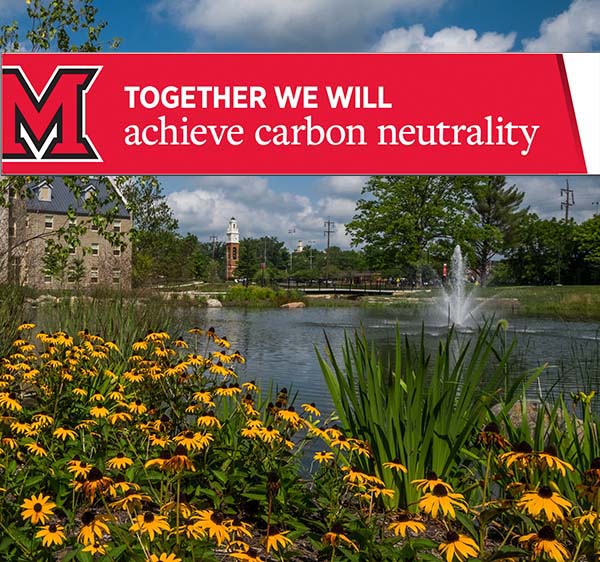Miami University receives third STARS Gold rating for sustainability achievements
Miami’s fifth submission to STARS continues to showcase and advance campus-wide sustainability efforts. The 2025 report was submitted through the latest version of STARS — v3.0, the “Next-generation sustainability framework for colleges and universities”
Miami University receives third STARS Gold rating for sustainability achievements

Miami University has achieved its third STARS Gold rating in recognition of its sustainability achievements from the Association for the Advancement of Sustainability in Higher Education (AASHE). STARS, the Sustainability Tracking, Assessment & Rating System, measures and encourages sustainability in all aspects of higher education.
With more than 1,200 participants in 52 countries, AASHE’s STARS program is the most widely recognized framework in the world for publicly reporting comprehensive information related to a college or university’s sustainability performance. Participants report achievements in five overall areas: academics; engagement; operations; planning and administration; and innovation and leadership.
Miami submitted its 2025 report this summer through the latest version of STARS — v3.0, the “Next-generation sustainability framework for colleges and universities.”
Miami’s STARS report is publicly available on the AASHE STARS website. The report and rating is valid for three years, through June 2028. Previously Miami achieved a STARS Gold rating in 2022 (v2.2) and 2019 (v 2.1); and a Silver rating in 2016 and 2013.

“Achieving a STARS Gold is a campus-wide effort, even more so this year with STARS v3.0” Olivia Herron, director of sustainability, said. “Thank you to everyone at Miami who contributed!”
“Miami University’s fifth submission to STARS continues to showcase and advance our campus-wide sustainability efforts,” Miami University President Gregory Crawford said.
“For more than a decade, Miami has been aggressively pursuing sustainability initiatives. Now, we are firmly committed to achieving carbon neutrality on our Oxford campus by 2040,” President Crawford said. “Miami is proud to be part of the growing movement for sustainability in higher education,” he said.
Later this fall, Miami will take a big step toward reaching it's carbon neutrality goals.
"We are excited about producing our own electricity from solar power through our new solar fields. The solar arrays were just completed this month, and once all the rest of the equipment is in place, they are expected to start producing around 2,000 megawatt hours (MWh) of electricity annually," President Crawford said.
The two solar arrays will be part of the Sharon and Graham Mitchell Sustainability Park, made possible by a $5 million principal gift from longtime Miami and sustainability supporters, Sharon Janosik Mitchell ’73 and Graham Mitchell ’73, M.En. ’76.
Opening next spring, the park will encompass the solar fields, walking paths, and connect to nearby trails in Miami University’s Natural Areas, with a grand entrance facing State Route 73.
Significant progress in sustainability, decarbonization
Miami’s last STARS submission was in 2022. Since then, Miami has made significant progress toward carbon neutrality and decarbonization on campus and other sustainability initiatives:
- Climate Action Plan: In May 2024, President Crawford signed the Miami 2040 Climate Action Plan, which outlines the goals and strategies for reaching net carbon neutrality by 2040 on Miami’s Oxford campus. This plan builds on the success of our 2012 Utility Master Plan with energy systems infrastructure conversions, energy conservation, and building improvements. Since then, utility-based carbon emissions have been reduced by more than 50%, and a remarkable accumulated savings of more than $100 million (2008-2024) has been achieved.
- Geothermal Expansion: In June 2024, Miami began a major geothermal expansion project on the North part of campus, with the drilling of 520 geothermal wells, 850 feet deep. Well drilling was completed this summer, and conversion of the North Chiller Plant to support the geothermal exchange geothermal is expected to be completed by spring 2026.
- Solar Energy Investment: Miami took another step toward decarbonizing campus energy systems with the installation of two ground-mount solar arrays. More than 3,300 solar panels were installed this summer, and once all the equipment is in place and connected to the electric grid later this fall, the two arrays will produce around 2,000 MWh of electricity annually. This significant step toward carbon neutrality and promoting sustainability is part of the Sharon and Graham Mitchell Sustainability Park and Solar Field.
- Community Education and Engagement: During the 2024-2025 academic year, Miami intensified efforts to educate the community about the Oxford campus goals for achieving carbon neutrality and sustainability initiatives. A 10-minute staff training course and survey was created, and more than 75% of all Oxford-based, non-instructional staff have participated in this Workday Learn Staff Sustainability Training short course, helping to embed sustainability awareness across campus operations.
- Academic Integration: As of 2023-24, 100% of academic departments on the Oxford campus offer sustainability-focused or sustainability-inclusive courses. A sustainability course list has been published on the Sustainability website.
- Miami’s Office of Sustainability, in partnership with the Office of ASPIRE, established and filled a new position for a Sustainability Engagement Coordinator. Alex Miller began in this role in January 2025.

In other projects, “We have offered food scrap composting at the Armstrong Student Center for the past two years, assisted by an OSCAR Smart Waste system, Herron said. “More than 23,000 pounds of food waste from dining services was diverted from the landfill in the last two years.”
She added, “Here in Physical Facilities, we plan to electrify lightweight vehicles when cost-effective. Just this spring, we replaced two old vehicles with Ford Lightning EVs (electric vehicles).”
About AASHE STARS
“STARS was developed by the campus sustainability community to provide high standards for recognizing campus sustainability efforts,” AASHE Executive Director Meghan Fay Zahniser said.
Unlike other rating or ranking systems, this program is open to all institutions of higher education, and the criteria that determine a STARS rating are transparent and accessible to anyone. Because STARS is a program based on credits earned, it allows for both internal comparisons as well as comparisons with similar institutions.